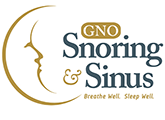Allergy Treatment

Types of Allergies
While there are multiple forms of allergies such as food allergies, insect allergies, and drug allergies, GNO Snoring & Sinus exclusively deals with allergic rhinitis (hay fever). These allergies are caused when your immune system recognizes a substance as harmful and produces antibodies in response. Depending on your circumstances, allergic rhinitis can cause multiple symptoms.
Allergy Symptoms
The most common allergy symptoms include:
- Itching of the nose, eyes, or roof of the mouth
- Swelling of the lips, tongue, face, or throat
- Hives
- Coughing, chest tightness, wheezing, or shortness of breath
Allergy Treatments
While your treatment options may vary depending on the severity of your symptoms, some common allergy treatments include:
Medications
Depending on the type of allergies you’re suffering from, medications can help to lessen the reactions of your immune system and reduce your daily symptoms.
Emergency epinephrine
If you suffer from severe allergies, Dr. Anand may recommend that you carry an emergency epinephrine shot with you at all times. These shots can help reduce the symptoms of an allergic reaction until you can find emergency medical treatment.
Allergen avoidance
As part of your treatment, Dr. Anand may recommend ways to identify and avoid your allergy triggers. This is usually the first step in reducing your allergy symptoms.
Immunotherapy
Dr. Anand may recommend immunotherapy for severe allergies or allergies not fully relieved by other methods. This treatment involves you typically undergoing a series of injections of purified allergen extracts. Another common form of immunotherapy includes patients placing a tablet under their tongue until it dissolves.
New Patient Visits for Allergy Treatment
Initial Visit
Workup
Treatment
Allergy FAQs
What is an allergy?
An allergy occurs when you react to things like pollen or cats that don’t affect most people. If you come into contact with something you are allergic to (called an allergen), you may have symptoms such as itching or sneezing.
How are skin tests done?
At GNO Snoring & Sinus, we perform scratch testing. A tiny drop of an allergen is placed into the skin. This is the most common type of skin test.
What can I expect during a skin test?
What do the skin test results mean?
How should I prepare for the test?
What happens if the skin test shows I have allergies?
Your provider will create a plan for controlling your allergies. This means preventing and treating symptoms.
- Avoid or limit contact with your allergens. For example, if you’re allergic to dust mites, reduce the clutter in your house, which collects dust.
- Take medicine to relieve your symptoms. Your provider may prescribe medicines such as antihistamines, decongestants, leukotriene inhibitors, nasal sprays, or eye drops.
- Allergy shots: Some people need them when they can’t avoid an allergen. The shots contain a tiny but increasing amount of the allergen you’re sensitive to. Over time, the small increases in the amount of your allergen – things like dust, pollen, mold, and pet dander – cause the immune system to become less sensitive to it. That reduces your allergy symptoms when you come across the allergen in the future.
- Office procedures: Nasal procedures do not treat the underlying allergy but do treat symptoms of nasal congestion and postnasal drip. For patients in whom medications fail to control these symptoms, office procedures effectively provide symptomatic relief.
Contact the Highly Personal Team at GNO Snoring & Sinus
Dr. Anand has performed more than 6,000 sinus and sleep apnea procedures and is a leading authority in the treatment of sleep and sinus disorders for patients in the Greater New Orleans area. We proudly accept Medicaid, Medicare, and private insurance plans for all of our allergy treatments and other services. Request an appointment at GNO Snoring & Sinus to help find relief for your allergies.
